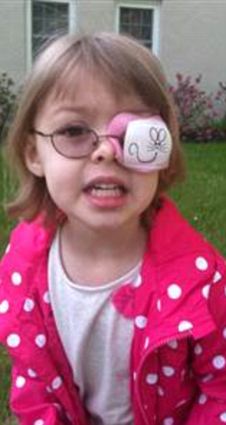
Three-year-old Emmelyn Roettger of Washington D.C. loves writing, spelling and counting and is fascinated by science and space.
Despite her tender age Emmelyn Roettger, known as Emme, is familiar with the concept of mitosis and can explain the process of metamorphosis in butterflies.
In fact her outstanding thirst for knowledge and academic competency is such that she has earned herself a place in Mensa, becoming the high-IQ society’s youngest U.S. member.
Emmelyn Roettger was accepted into the club in March, aged two years and 11 months, with an IQ of 135.
The little girl suffers from poor vision, causing “unspecified delays” in her development which doctors had initially mistaken for signs of autism.
But when her mother, Michelle Horne, thought to get her vision checked everything fell into place and Emme’s talents took off.

Wearing glasses the youngster immediately showed an unusually high appreciation for the world around her.
“She showed an obvious want for things,” her mother told MSNBC, “grabbing at things, trying to get to toys, fussing for things that she couldn’t reach — and she started crawling within a few weeks.”
By 15 months she was recognizing letters and could write them before turning two. She learnt to write her name and count to 100 shortly after her second birthday and simple maths puzzles came naturally to her.
But paediatricians continued to refer to the toddle as “delayed” so her mother sought support from other avenues.
Emmelyn Roettger came across the Wechsler Preschool and Primary Scale of Intelligence, a standardized intelligence test designed for children between the ages of two and a half and seven.
Emme scored so highly (in the 99th percentile on all measures) that Michelle Horne submitted her score to Mensa.
“My husband thought it was a silly idea at first,” Michelle Horne said.
“I was looking for support, though, and I thought Mensa could be another resource for us.”
The society accepted Emme into its family, as the youngest U.S. member. Her parents hope her unusual talents will be nurtured and challenged by being in the club.
Frank Lawlis, American Mensa’s supervisory psychologist and author of The IQ Answer, told MSNBC that while life can be easier in some ways for kids with sky-high IQs, in other ways it is limiting.
“There’s a social stigma to being very smart, just like there’s a stigma to being retarded,” he said.
“It can limit a person’s potential for social relationships.”